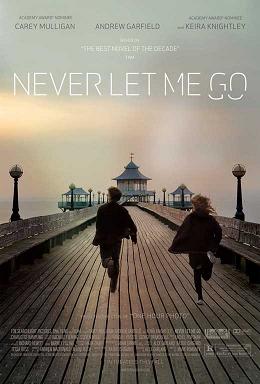The London Film Festival opens tonight with Never Let Me Go
 The London Film Festival opens tonight with a screening of Never Let Me Go, an adaptation of the 2005 Kazuo Ishiguro novel, starring Carey Mulligan, Keira Knightley and Andrew Garfield. The screenplay was written by Alex Garland, and the movie directed by Mark (One Hour Photo) Romanek.
The London Film Festival opens tonight with a screening of Never Let Me Go, an adaptation of the 2005 Kazuo Ishiguro novel, starring Carey Mulligan, Keira Knightley and Andrew Garfield. The screenplay was written by Alex Garland, and the movie directed by Mark (One Hour Photo) Romanek.
The story takes place in an alternate England, where medical research has solved most illnesses, and the average life expectancy has passed 100 years old by 1967.
These great developments have come about thanks to the National Donor Programme, where human clones - who cannot reproduce but do think, feel and age just like us - are brought up in institutions and taught to accept their futures as organ donors. They will give away parts of their body, one by one, until they "complete," usually before the age of 30.
Kathy H, our 28-year-old narrator, is a carer watching a donor be put under for his operation. She starts to reminisce about her time at boarding school - a place called Hailsham - and about her time growing up with her friends Tommy and Ruth.
Warning: spoilers ahead
Carey Mulligan, who plays Kathy, said in the junket after this morning's press screening, that she thinks of the book firstly as a "love story." As children, Tommy and Kathy are close, but jealous Ruth steams in and snatches him from her friend, whom she dominates.
There is a persistent rumour throughout the film and the book, that a clone couple who can prove that they are really in love can apply for a "deferral": a few years to be together before they start their donations. As with our lives, love is held up as a solution to all problems; Tommy even collects together some pieces of paper as "proof" of his love, as human beings have been known to do. Sadly, none of the clones can be saved from their fate. The rumour of love's power to cheat death is, in the end, just a rumour.

Kazuo Ishiguro said in today's junket that, when writing the novel, he was looking to parallel human existence. The three protagonists live out a speeded-up life, never seen more clearly than when Knightley's Ruth, two donations in, is wheezing about on a zimmerframe and talking about Tommy's health. She's convincing: the scenes of her being carried along by Kathy and Tommy shows how life cruelly cuts some down before others, and how, in reuniting after a long time, we have to eventually acknowledge that some of our friends have lost while we have remained the same.
Ishiguro made another useful point this morning: that we allow people in poorer countries to furnish us with our comfortable lives. Although it is not remarked upon in the film, there are a few moments where human characters flinch at the clones - even when they are children - and these small expressions of disgust encapsulate an important message behind the movie: that we are very good dehumanising when we need to. Although the clones are lifesaving donors and look exactly like humans, they are meant for a different purpose, and, as such, strike a little fear into human beings. This makes it easier for them to then kill the clones after using up their resources.
Never Let Me Go is bleak, and ultimately painful. Rather than suggesting that this is where medical science will necessarily take us, it is instead a look at the human condition from a sideways view. Unsurprisingly, that can make for difficult viewing.
The 54th BFI London Film Festival opens tonight and runs 13th-28th October 2010. For more information, please see the website.